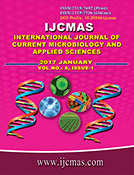


 National Academy of Agricultural Sciences (NAAS)
National Academy of Agricultural Sciences (NAAS)

|
PRINT ISSN : 2319-7692
Online ISSN : 2319-7706 Issues : 12 per year Publisher : Excellent Publishers Email : editorijcmas@gmail.com / submit@ijcmas.com Editor-in-chief: Dr.M.Prakash Index Copernicus ICV 2018: 95.39 NAAS RATING 2020: 5.38 |
Blood stream infections can lead to life threatening sepsis and require immediate antimicrobial treatment. Blood culture is an essential tool for the investigation of clinically suspected bacteremia or septicemia. A timely detection of organism type and antibiotic susceptibility testing is critical for the effective treatment of the patient. Illness associated with blood stream infection ranges from self-limiting infections to life-threatening sepsis that require rapid and aggressive antimicrobial treatment. The present study was to describe the profile of bacterial isolates from the blood cultures in a Polyclinic and to know their antibiotic resistance, so that the study can provide guidelines for choosing an effective antibiotic therapy in cases of septicemia. This is a retrospective study of 2452 blood samples collected from clinically suspected cases of bacteraemia reviewed over a period of one year in vevekananda polyclinic & institute of medical Sciences. 2452 blood samples collected over a year from clinically suspected cases of bacteremia were studied. The isolates were identified by standard biochemical tests and antimicrobial resistance patterns were determined by CLSI guidelines 2013. Positive cultures were obtained in 752 (30.6%) cases. Among culture positive isolates, Gram-negative bacteria accounted for 51.2% cases; most common being Klebsiella spp (23%) followed by Escherichia coli (20%) and Acinitobacter (04%). Of the pathogenic Gram-positive isolates, Enterococci (20%) was the predominant isolate followed by Coagulase negative Staphylococci (16%). Maximum Gram-negative isolates were sensitive to Colistin (95%) and Imipenen Meropenem (90). Daptomycin sensitivity was reported in 100% Staph. aureus and CONS and Vancomycin 90% in Enterococcus spp. This study provides information on antibiotic resistance of blood isolates. It may be a useful guide for physicians initiating empiric therapy and will help in formulation of antibiotic therapy strategy.
 |
 |
 |
 |
 |